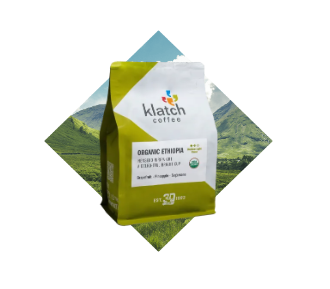
About this Coffee
Discover the Organic Ethiopia Nensebo Riripa Gr1, a washed medium-light roast that will be your go-to choice. Experience the delightful flavors of citrus grapefruit, sweet tropical pineapple, and a sugarcane finish in every cup.
The coffee sourced from smallholders in Riripa village in West Arsi, Sidamo is known for its high elevation cultivation, ranging from 1,900 to 2,200 meters above sea level. The coffee cherries are delivered by the farmers to a local washing station that is owned and operated by SNAP Trading & Industry PLC.
Sidamo coffees are renowned for their diverse flavor profiles, which can be attributed to the region’s varied microclimates and soil types. Each town within Sidamo may exhibit striking differences in taste. However, despite these variations, there is a consistent underlying complexity found in all Sidamo coffees, which is often attributed to the diverse range of local landrace coffee varieties. Many would say that the strength of Sidamo coffees lie in the regions’ diversity of profiles.
The many microclimates and varying soil types lead to striking differences from town to town. But across all Sidamo coffees is a profound complexity that many attribute to the diversity of local landrace varieties. Varieties can differ from town to town and even farm to farm where each farmer may have more than one unique varieties seldom or never found outside their plot. When all these different varieties are blended at the local cooperative, the resulting blend expresses the complexity of the plant genetics in the area. Farming methods in Sidamo remain largely traditional. Sidamo farmers typically intercrop their coffee plants with other food crops. This method is common among smallholders because it maximizes land use and provides food for their families. In addition to remaining traditionally intercropped, most farms are also traditional and organic by default. Farmers in Sidamo typically use very few—if any—fertilizers or pesticides. Most farm work is done manually and very few tasks are mechanized, even during processing.
Farmers selectively handpick ripe, red cherry and deliver it to SNAP’s washing station. At intake, cherry is carefully inspected and only dense, ripe cherry is selected.Cherry is pulped on a disk pulper and fermented. Parchment is washed in clean water and laid to dry on raised drying beds. Workers rake parchment frequently to ensure even drying. It takes approximately 7 to 10 days for parchment to dry. Once dry, parchment is bagged and stored in a warehouse at the washing station. Dry parchment is stored for about 1 month before being transported to the dry mill where it is hulled and prepared for export. While Ethiopia is famous as coffee’s birthplace, today it remains a specialty coffee industry darling for its incredible variety of flavors. While full traceability has been difficult in recent history, new regulations have made direct purchasing possible. We’re partnering directly with farmers to help them produce top quality specialty lots that are now completely traceable, The exceptional quality of Ethiopian coffee is due to a combination of factors. The genetic diversity of coffee varieties means that we find a diversity of flavor, even between (or within) farms with similar growing conditions and processing.
In addition to varieties, processing methods also contribute to end quality. The final key ingredients for excellent coffee in Ethiopia are the producing traditions that have created the genetic diversity, processing infrastructure and great coffee we enjoy today.
Most producers in Ethiopia are smallholders, and the majority continues to cultivate coffee using traditional methods. As a result, most coffee is grown with no chemical fertilizer or pesticide use. Coffee is almost entirely cultivated, harvested and dried using manual systems. This coffee is fully washed at a central washing station. Farmers deliver their ripe cherries to the washing station where they are carefully sorted and floated to select only the highest quality for processing. The cherries are pulped and then fermented in water for 36-48 hours depending on ambient conditions. The coffee is then thoroughly washed in clean water grading channels, after which it is dried in the sun on raised African beds for 12-15 days, or until the optimum moisture content has been reached.
In the daytime the parchment needs to be raked and turned periodically to ensure a consistent drying process.The coffee is also covered between 12pm and 3pm to protect it from the hot sun, and at night time to protect it from rainfall and moisture. Refisa washing station is located in Nensebo woreda, Sidamo, in the Oromia region of Ethiopia. The region has a distinguished reputation for producing some of the most sought-after and characterful coffees in the world. The combination of high altitude, plentiful sunshine, unique – indigenous heirloom – varieties and an abundance of local knowledge all contribute to a cup profile characterised by clean, citric acidity, sweet chocolate notes, and floral notes.